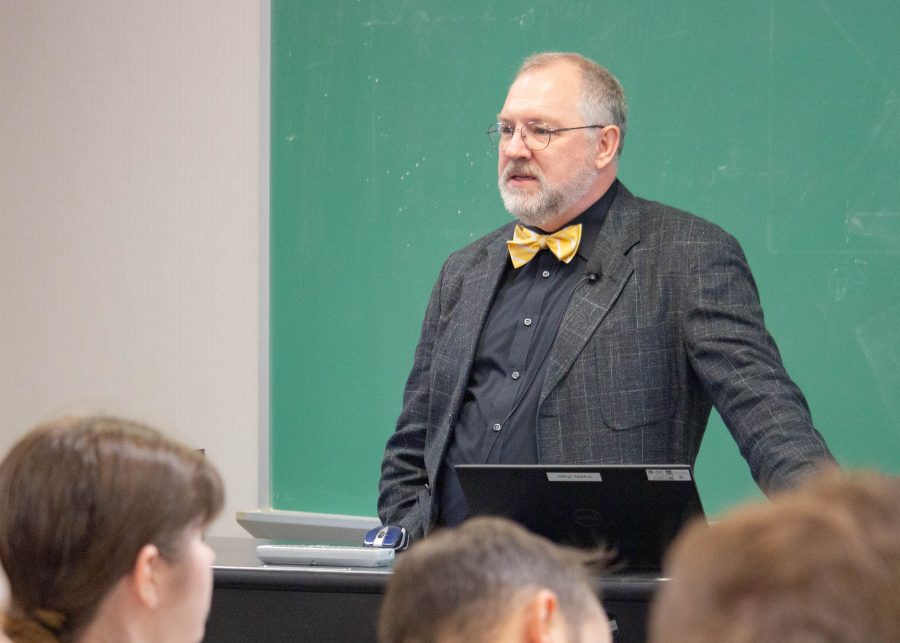The BJU core, courses that each person who studies at BJU must take to graduate, attempts to prepare students to communicate, make decisions and live biblically.
Dr. Doug Garland, the director of assessment, said many students, desiring to get to major classes, undervalue the core during their undergrad years. But he said this attitude changes after graduation. “One of the big things that we have learned from alumni is that the most valuable part of their education is not their major,” Garland said. “It’s the core.”
The core covers varied subjects, giving BJU students a liberal arts education. These subjects include writing, communication, history, economics, the arts, logic, philosophy and science. “What we’re trying to do here is broaden people out,” Garland said.
Ashley Ellis, senior history major, said the core is important for education, especially biblical education. “Bob Jones [University] does offer through their core classes a good basis of knowledge that prepares you for the outside world,” Ellis said.
Students are required to take nine credits of English courses. Which courses students take depend on what level students test into. Two common courses include Composition and Rhetoric and Composition and Literature. In Composition and Rhetoric, students learn how to write and research academic papers. After taking that course, students in Composition and Literature work on analyzing works of literature and using the written word to express this analysis.
Noah Mansfield, senior computer science major, said the English classes he took helped his writing. “I struggled with English in high school,” Mansfield said. “It really helped me get up to speed quickly to a point where I feel more comfortable about my writing.”
Two speech courses typically bookend a student’s bachelor level education: Fundamentals of Speech and another course, which varies depending on the major, from Oral Communication for the Professions to Classroom Communication and others.
Fundamentals of Speech gives students the chance to develop their oratory skills with multiple speeches, including one focused on informing and another on persuading. Garland said the University emphasizes written and oral communication because of the positive results BJU’s education has shown in that area.
“We know from survey data that when our students get out in their professions, one of the things that sets them apart is their ability to communicate,” Garland said.
Foundations of Economics helps students understand both microeconomics and macroeconomics. “Every occupation, every ministry has connections to financial things,” Garland said. “That’s why we take economics . . . to understand the broader economic system.”
History of Civilization is a two-semester course which works through world history, starting at 3500 B.C. and finishing at present day. Garland said one of the main reasons history is required is to set each major within its historical context.
Themes in Western Thought guides students through various western philosophers, including Plato, Karl Marx and Friedrich Nietzsche. Garland said this course allows students to identify how problems in their fields of studies fit within the history of western thinking.
Ellis said the Themes class, as well as the Bible course Apologetics and Worldview, are important to her history major because they cover material which will be expounded on more in history courses. “It gives a very good base for learning more,” Ellis said. Essential Science examines science through a biblical worldview, examining the science of evolution, cosmology and the environment. Christianity and the Arts examines different art forms (including visual art, theatre, film and music) in relation to a biblical worldview.
Students also typically must take a math, science or computer science elective to round out their education. Potential options for this course include (but are not limited to) Introduction to Computer Programming, Applied Statistics and Chemical and Physical Science. Garland said the purpose of a math, science or computer science elective is to teach logical thinking, something everyone will use at some point in their lives.
In addition, the BJU core includes five required Bible courses: Old Testament Literature and Interpretation, New Testament Literature and Interpretation, Doctrines I and II, and Apologetics and Worldview. Garland said the latter’s apologetics paper is the capstone project of the core, giving students the chance to show what they’ve learned through a paper about a controversial topic in their field of study.
Core requirements can vary, depending on a student’s major, but regardless of major, the core develops well-rounded, prepared professionals who leave BJU to work around the world.

























































